The second-wettest spring in Chicago's history ended Sunday, clocking in at 427 mm of precipitation since March 1st. (The record was 445 mm set in 1983.)
Temperatures averaged just a bit above normal for the season, at 10.2°C (1.0°C above normal).
Today we might get a record high temperature. The forecast calls for 33°C, which would tie the record set in 1944.
Also, the Lake Michigan-Huron system finished its fifth straight month with record water levels, averaging about 930 mm above normal.
The Illinois State Climatologist office has more.
No larger message here. I just thought a post about the weather would be a good break from everything else.
Summer ends in about two hours here in Chicago, after a kind of perfect late-summer day. The day is ending with a cool, gentle rain, which will clear up before dawn.
The end of August being the end of summer infused art and music for millennia before meteorologists set September 1st as the first day of autumn for statistical convenience. Maybe this is happy alignment of science and art?
Here's Dar Williams with the verdict:
First, New York Times film critic A.O. Scott takes a second look at the 1999 film Election:
The movie has been persistently and egregiously misunderstood, and I count myself among the many admirers who got it wrong. Because somehow I didn’t remember — or didn’t see— what has been right there onscreen the whole time.
Which is that Mr. M is a monster — a distillation of human moral squalor with few equals in modern American cinema — and that Tracy Flick is the heroine who bravely, if imperfectly, resists his efforts to destroy her. She’s not Moby-Dick to his Ahab so much as Jean Valjean to his Inspector Javert.
Second, with Lake Michigan at record-high water levels for the second month in a row, several of Chicago's beaches have disappeared:
This year, the buoyant water has swallowed at least two Chicago beaches entirely and periodically closed others. It has swiped fishermen from piers, swimmers from beaches and submerged jetties, creating hazards for boaters. It has flooded heavily trafficked parts of lakefront bicycle and pedestrian pathways, leaving some stretches underwater and others crumbling.
But perhaps the most worrisome aspect of this summer is that these perils have occurred while the lake has remained mostly calm.
“Fall is the time of the year when wave conditions are historically the most severe on the Great Lakes,” said David Bucaro, outreach manager at the U.S. Army Corps of Engineers Chicago District. “We’re at a calmer period right now. There’s been some summer storms. But that October, November time period is when we really experience historically the most powerful coastal storms. That’s the conditions that we’re monitoring and are most concerned with.”
Should be fun this fall.
Next, writing for the LA Times, Rebecca Wexler points out that data-privacy laws giving law enforcement the power to snoop on electronic devices is deeply unfair to defendants for an unexpected reason:
Social media messages, photo metadata, Amazon Echo recordings, smart water meter data, and Fitbit readings have all been used in criminal cases. The new laws would limit how defendants can access this key evidence, making it difficult or impossible for defendants to show they acted in self-defense, or a witness is lying, or someone else is guilty of the crime.
The California Consumer Privacy Act, which was approved in 2018, allows law enforcement officers to obtain data from technology companies and prohibit those companies from immediately notifying the person they are investigating. Such delayed notice may be necessary to investigate someone who is dangerous or likely to destroy evidence or flee. But the law does not give defense investigators the same right to delay notification to witnesses or others — who might well pose a threat to the defendant — when they subpoena data from tech companies as part of the defense’s case.
I will now rejoin a long-running data analysis project, already in progress.
As I mentioned this morning, the UK Met predicts that tomorrow—Boris Johnson's first full day as UK PM—will be the hottest day in recorded history for the country. Today, however, is already the hottest day in recorded history for the Netherlands and Belgium:
The Dutch meteorological service, KNMI, said the temperature reached 39.1°C at Gilze-Rijen airbase near the southern city of Tilburg on Wednesday afternoon, exceeding the previous high of 38.6°C set in August 1944.
In Belgium, the temperature in Kleine-Brogel hit 38.9°C, fractionally higher than the previous record of 38.8°C set in June 1947. Forecasters said temperatures could climb further on Wednesday and again on Thursday.
After several cities in France broke previous temperature records on Tuesday, including Bordeaux, which hit 41.2°C, the national weather service, Météo France, said Paris was likely to beat its all-time high of 40.4°C, set in July 1947, with 42°C on Thursday.
City records in Amsterdam and Brussels are also expected to fall. Cities are particularly vulnerable in heatwaves because of a phenomenon known as the urban heat island effect, in which concrete buildings and asphalt roads absorb heat during the day and emit it again at night, preventing the city from cooling.
Scientists have said such heatwaves are closely linked to the climate emergency and will be many times more likely over the coming decades.
Last month, the Potsdam Institute for Climate Impact Research said Europe’s five hottest summers since 1500 had all occurred in the 21st century – in 2018, 2010, 2003, 2016 and 2002.
And the band played on.
For seven of the last 11 days Chicago has had highs above 32°C, maxing out yesterday afternoon at 35°C. Then around 4pm yesterday, a cold front dropped temperatures 10°C in an hour—along with 20 mm of rain.
It wasn't the worst summer weather Chicago has had in its history, but we're pretty sure it'll be more common in years to come.
The forecast for much of the US Friday calls for hot and shitty weather, with continued hot and shitty weather into Saturday:
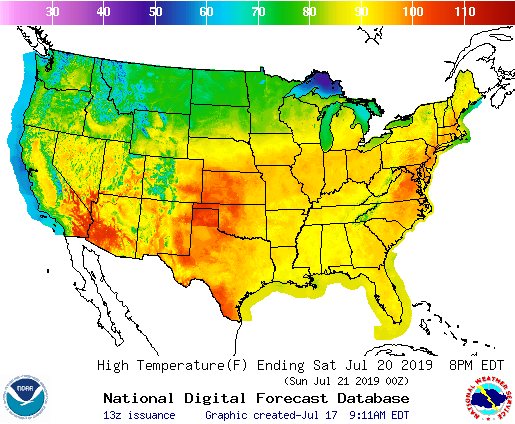
A heat wave featuring a life-threatening combination of heat and oppressive humidity has begun to spread across the United States, with excessive heat warnings and heat advisories in effect for at least 22 states and the District of Columbia. According to the National Weather Service, 51 percent of the Lower 48 states are likely to see air temperatures reach or exceed 35°C during the next seven days, with 85 percent experiencing temperatures above 32°C during the same period.
Washington could see its first high temperature at or above 38°C since 2016. In Chicago, the air temperature is also forecast to approach the century mark.
The heat index, which is a measure of how hot it feels to the human body when air temperatures are combined with the amount of moisture in the air, are forecast to climb into rare territory in many cities, from Chicago to Kansas City and eastward all the way north into southern New England.
According to the Weather Service forecast office in Chicago, “The heat is forecast to be oppressive and dangerous everywhere, with possibly some of the hottest conditions since 2012."
Yuck.
Stay cool, y'all. Excessive heat is the most dangerous weather. Hydrate, stay inside cool spaces, and limit your activities. Fun times, fun times.
We woke up in the US to two major stories about the planet, one with a short-term effect and the other with a long-term effect.
The acute problem: a 7.1 mw earthquake in central California caused only minor damage and no fatalities because it happened in the middle of nowhere. But people reported feeling it from Phoenix to Sacramento:
Southern California was jolted by a magnitude 7.1 earthquake at 8:19 p.m. on Friday one day after the region was hit by a 6.4 quake, the USGS reports.
The epicenter was 10.5 miles away from Ridgecrest, Calif., and there were no immediate reports of damage or injuries. According to the USGS, the quake was felt as far north as San Jose and as far south as parts of Mexico.
Thursday's quake struck at 10:33 a.m., and was the largest temblor to strike the region in 20 years, until Friday night. According to the USGS, a 7.1-magnitude earthquake is 11 times stronger than the 6.4 earthquake.
Meanwhile, parts of Alaska got up to 32°C Thursday, breaking records and (probably) allowing methane to leak from melting permafrost farther north:
At 5 p.m. local time Thursday, Anchorage reached 32°C for the first time in the state’s recorded history, topping the previous record set at Anchorage International Airport of 29°C on June 14, 1969.
Kenai and King Salmon, Alaska, both hit a new all-time high temperature record of 31.7°C, according to the National Weather Service. The previous high in Kenai was 30.6°C on June 26, 1953 and June 18, 1903. Palmer, Alaska, reached 31°C, matching its previous record of 31°C on May 27, 2011.
The state has been battling several wildfires, with a dense smoke advisory in effect until noon local time on Saturday for the interior Kenai Peninsula, including the cities of Kenai, Soldotna, Homer,and Cooper Landing, the National Weather Service said. Smoke from the Swan Lake fire will reduce visibility to a quarter mile or less at times, the weather service said, with the worst conditions taking place overnight through the morning hours.
Wildfires, particulates, subliming methane gas...yeah, even though the earthquake has gotten more press today, the heat in Alaska actually matters more.
This year, I went whole hog and got a 3-day pass to Chicago's main Ribfest. So this past weekend, I had a lot of ribs.
First, I should note that on days 2 and 3 I took friends. This is important because if you share four 3-bone samplers with someone you don't feel like you ate an entire pig as you stagger home from the event. Or five samplers. Not that I ate that many ribs on Friday...maybe.
Second, the weather Saturday and Sunday ranged from cool and damp to cool and rainy. Between that and arriving Friday evening just after opening, I didn't see the balls-to-the-wall crowds that I've usually encountered. Here's Saturday evening, after the rain stopped:
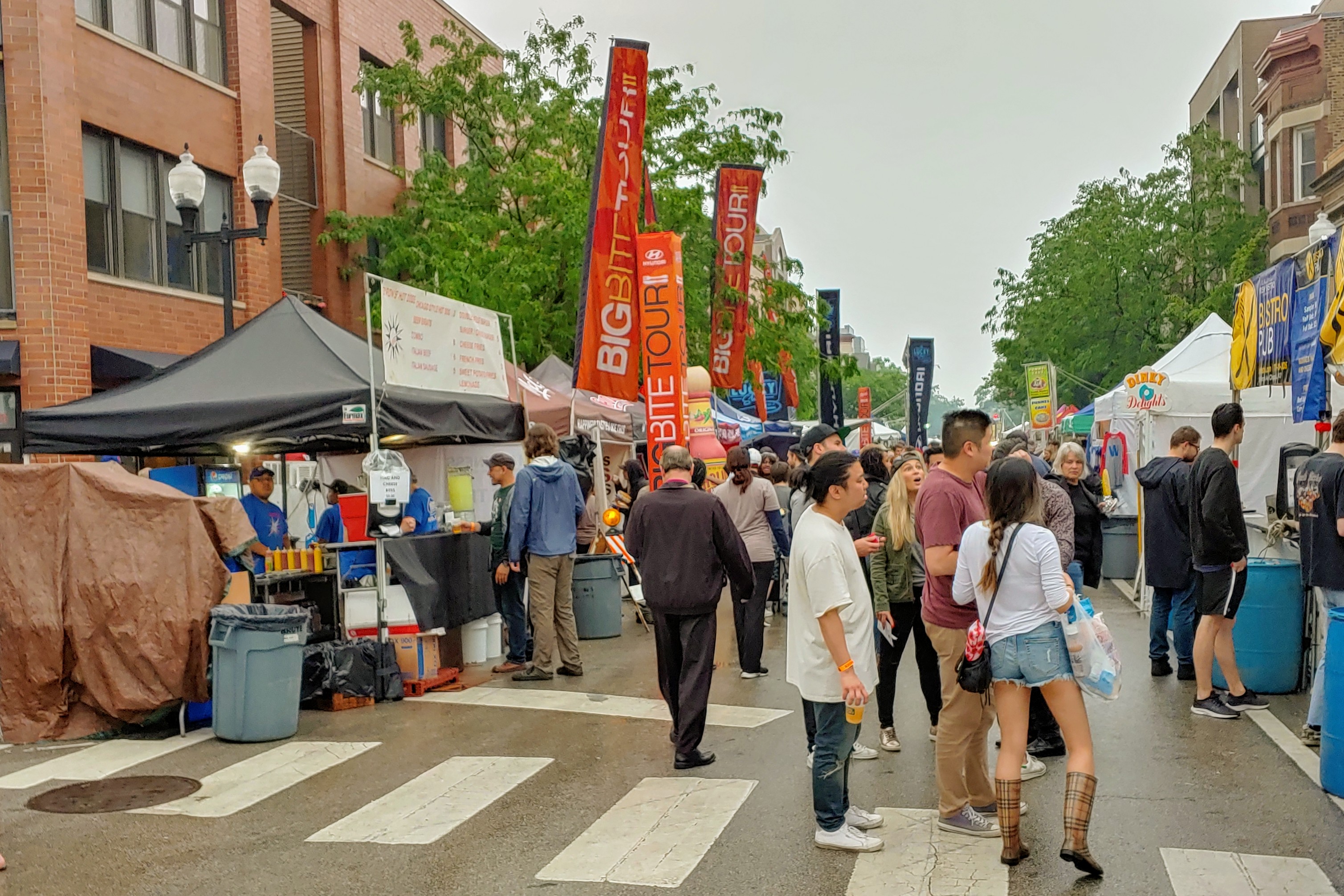
Contrast with, for example, 2013:
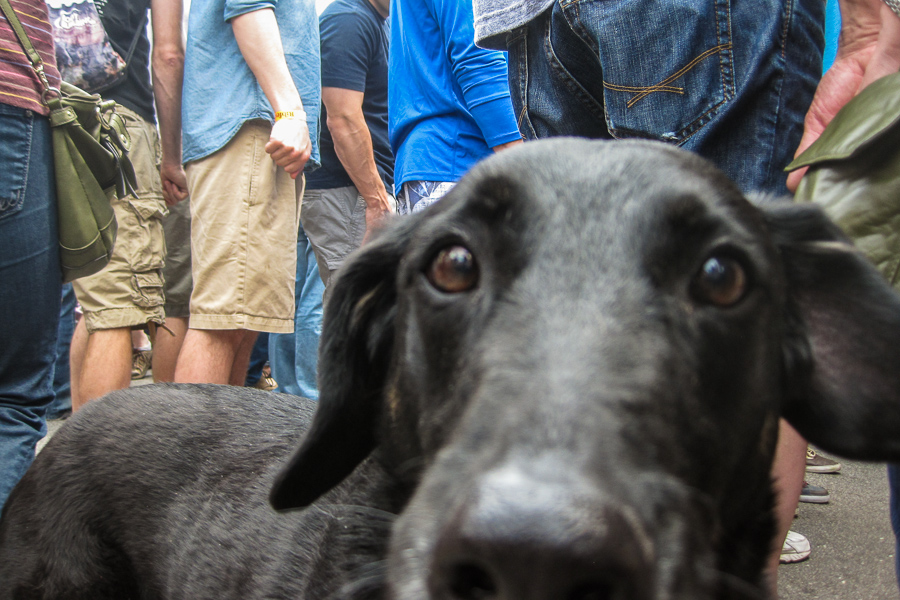
(Parker, having just turned 13, didn't go this year, poor old dog.)
Having three days, I got to try a lot of ribs:
- City BBQ, locations in Downers Grove and Orland Park: smoked, tug off the bone, firm meat; original sauce was sweet-tangy, "brush fire" sauce was a little spicier. Not great, 2½ stars.
- Austin Texas Lightning (two visits), itinerant: Smoked for 4 hours, then grilled. Tangy original sauce, good kick on the spicy one. Tasty meat but a lot of salt. Not bad. 3 stars.
- Famous Dave's, national chain: Pretty good meat, tug-off-the-bone; sauces all right, sauces OK but with lots of HFCS, so I have to ding them for that. 2½ stars.
- Fireside Grill (two visits), right in my neighborhood: tug off the bone, good crunchy finish on the grill, ladled-on sauce with good spice and flavor. My favorite from Friday. 3½ stars; will visit soon.
- Big Joe's Backyard BBQ, Homer Glen, Ill.: Dry meat, overcooked; sauces was eh, way too sweet. Good-sized bones. 2½ stars.
- Base Hit BBQ (two visits), Austin neighborhood of Chicago: Fall-off-the-bone, really tasty meat, nice char, excellent sauce. My favorite from this year's Fest. Worth a trip out to the West Side. 4 stars.
- Mrs Murphy and Sons Irish Bistro, Chicago: My favorite from years past, and still good, but their sauce tasted sweeter to me this year (which is not a good thing for my palette). Fall off the bone meat, really tasty. 3 stars.
On Sunday I also stopped by itinerant Chicago BBQ, which was just as itinerant as in years past, and just as acceptable. 3 stars.
Now: was the $100 3-day pass a good deal? It came with $50 in food tickets (which I used, and then some, because 3-bone samplers cost $8), free entry to the festival (a $30 value), skip-to-the-front access for drinks (saved some time), and air conditioned bathrooms (nice to have with their real soap and running water). I will probably do it again next year, especially if we have a hot June, which will make the cooler bathrooms maybe worth $20.
But before that, on July 4th, I'll bring Parker to the Windy City Ribfest less than 400 meters from my front door.
I had thought about going to see the Chelsea v Bournemouth match at Stamford Bridge today, and even tried to get tickets online for weeks. But getting an English Premier League ticket when you're not a club member is a bit like trying to get a Yankees-Red Sox ticket at Fenway day of game.
I did, however, (a) see Stamford Bridge and (b) buy a shirt, so I feel a bit like I participated.
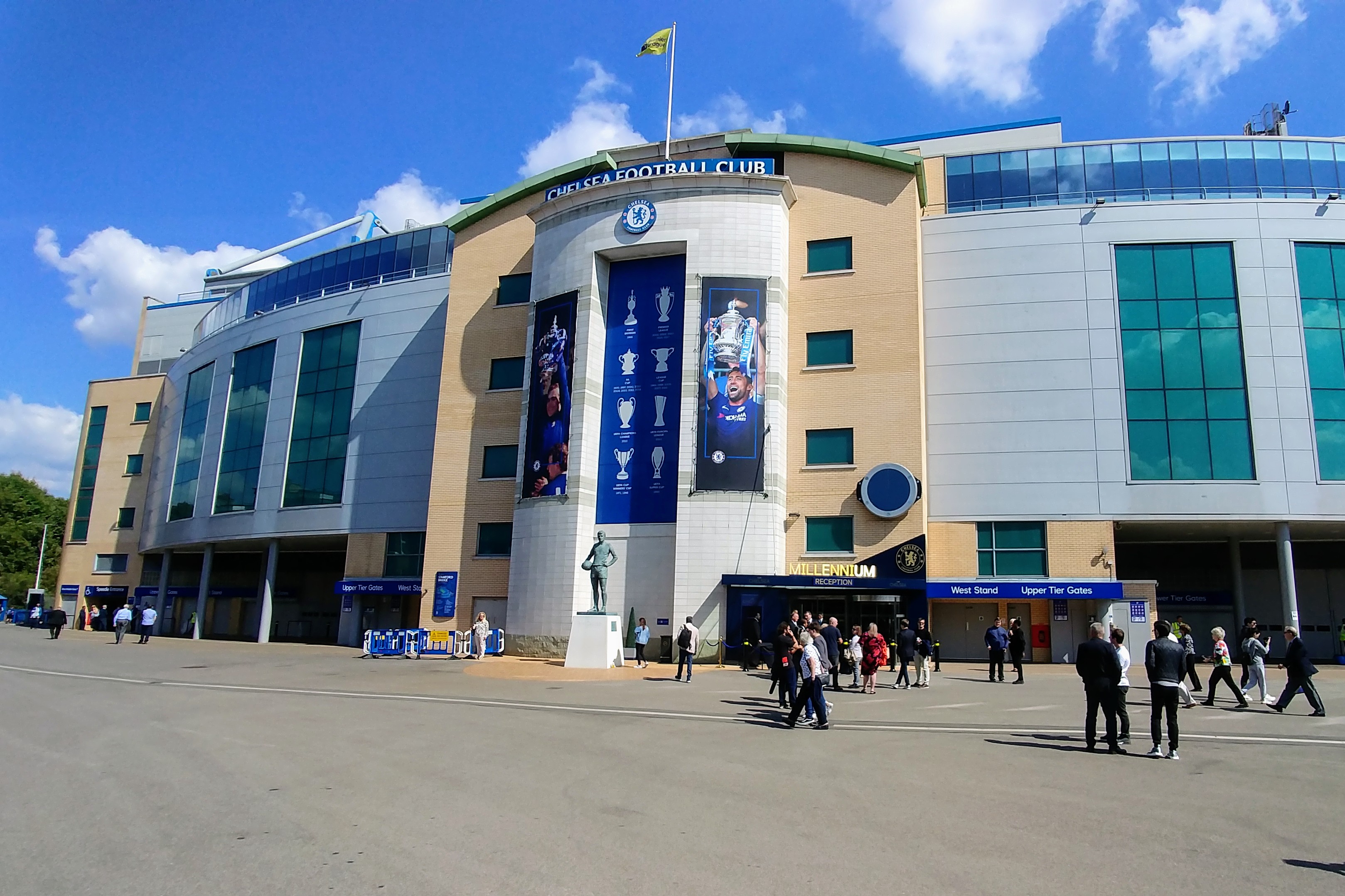
On the way back, I walked through Brompton Cemetery, which, like Graceland Cemetery back home, is something very close by that I haven't seen before. It was worth the detour:
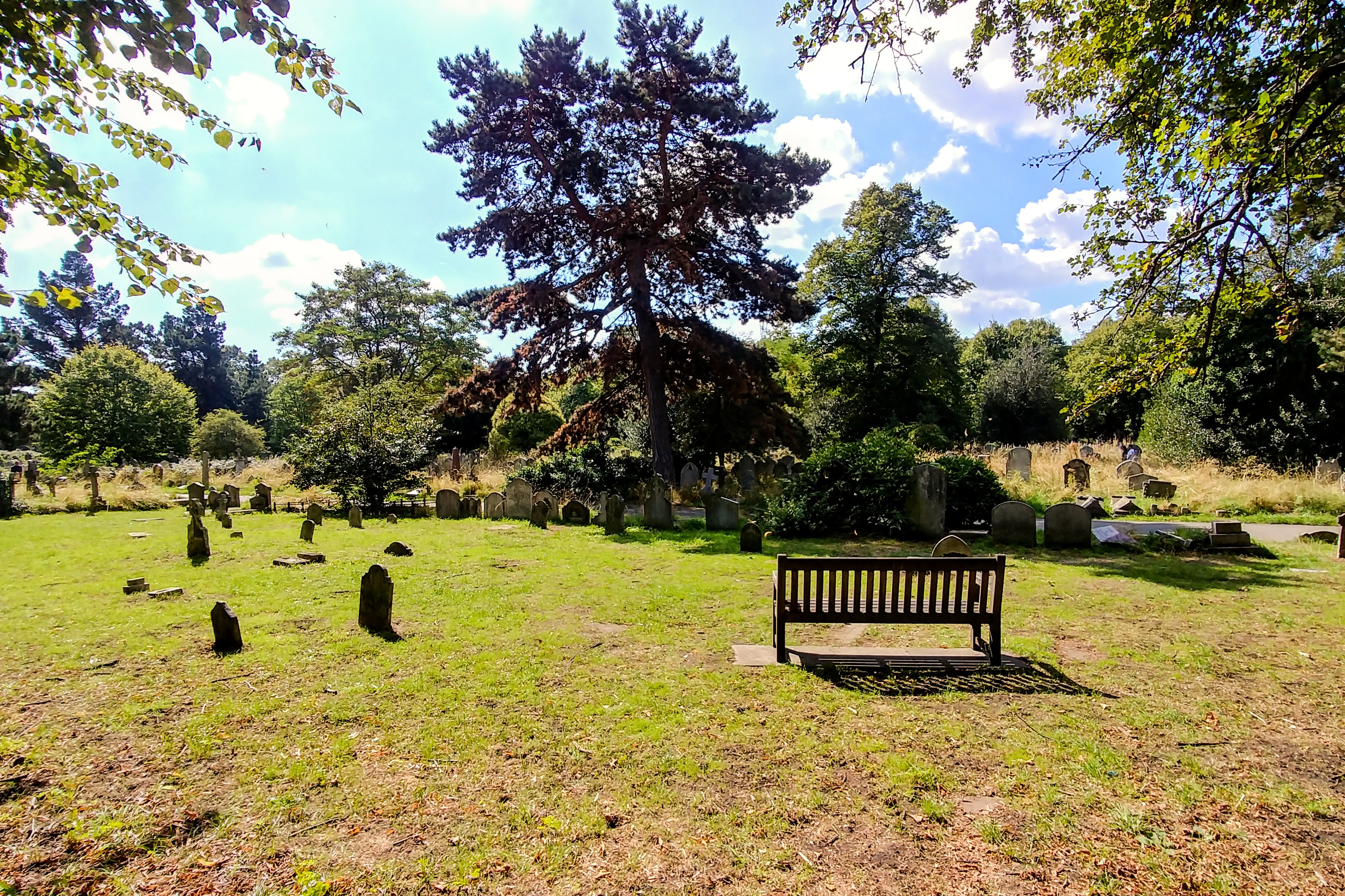
Note how not very green the place is right now. The UK really hasn't gotten a lot of rain this summer. It's quite grim.
I will now take a brief nap before heading out to Hampstead Heath on my way to Southampton Arms. And if my favorite pub in the UK is also closed, I will...go somewhere else, I suppose.